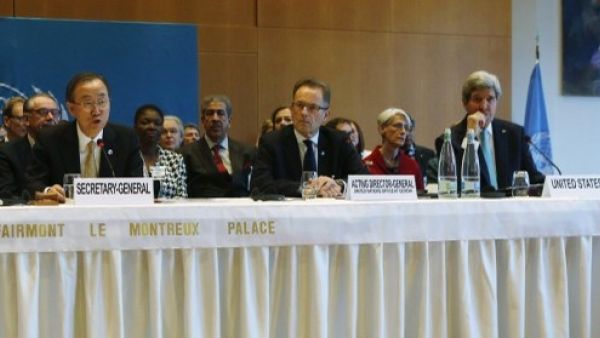Heightened tensions and the vast divide between opposing sides in the Syrian war were already on show in the opening statements of the Geneva II peace talks, which started Wednesday morning.
U.S. Secretary of State John Kerry reiterated that President Bashar Assad cannot be part of any transitional government, while his Syrian counterpart Walid Moallem accused the west of having Syrian blood on their hands.
Opening the meeting, Kerry said the talks would be a "test" of world's resolve, and would set the stage for tough negotiations.
But he immediately asserted the West's position that a leader responsible for violence against civilians, and a “torturer”, citing Tuesday’s report on the alleged torture and killing of thousands of detainees by the regime, has lost legitimacy to lead the country.
"One man can no longer hold an entire nation or region hostage," Kerry said, while also adding there would be no room in government for "terrorists" among the rebel forces.
Russian Foreign Minister Sergei Lavrov said it was the main task of the Syria peace conference "to achieve an end to the tragic conflict" and prevent a spillover to other countries in the region.
Lavrov, in his opening remarks, called on "external players" not to meddle in Syria's internal affairs. He said the internal political opposition should be part of a Syrian national dialogue, and that Iran, not present at the talks, should be part of the international dialogue.
Moallem said blood is on the hands of certain country representatives at the peace talks.
"The mask has fallen, we can see the real face of what they want: to destabilize and destroy Syria. Through exporting terrorism they have used their petrodollars to buy weapons... and flood international media with lies."
"How can a foreign terrorist respond to the needs of the Syrian people?"
Moallem launched into a tense exchange with United Nations Secretary-General Ban Ki-moon, who opened the morning by painting a bleak picture of the suffering of millions and of abuses of human rights by all the warring parties.
"Syrians must start talking to each other again," Ban said, urging both sides to reach a comprehensive settlement based on the U.N. Geneva Communique, under which world powers called in 2012 for a transitional government to oversee change in Syria.
"There is no alternative to ending the violence ... I appeal to all of you to show greater vision for humanity."
Interrupting Moallem, Ban asked the foreign minister to refrain from speaking over the allocated time slot.
In a tense exchange, broadcast live across the globe, Moallem snapped back: "You live in New York, I live in Syria," insisting that as he knew the reality of the nearly four-year-old war, he had the right to speak for longer.
Promising Ban to speak for "one more minute," he added, "Syria always keeps its promise."
Assad backer Iran was not present. A last-minute invitation from Ban to attend was revoked on Monday after the Syrian opposition threatened to boycott the talks, since Iran shares Assad's view that he should not lose power.
Iranian President Hassan Rouhani said that made it unlikely the conference could succeed: "Because of the lack of influential players in the meeting, I doubt about the Geneva 2 meeting's success in fighting against terrorism ... and its ability to resolve the Syria crisis," Rouhani said.
"The Geneva II meeting has already failed without it even being started," he was quoted as saying by IRNA news agency - though he added he would be pleased if it did help bring peace.








